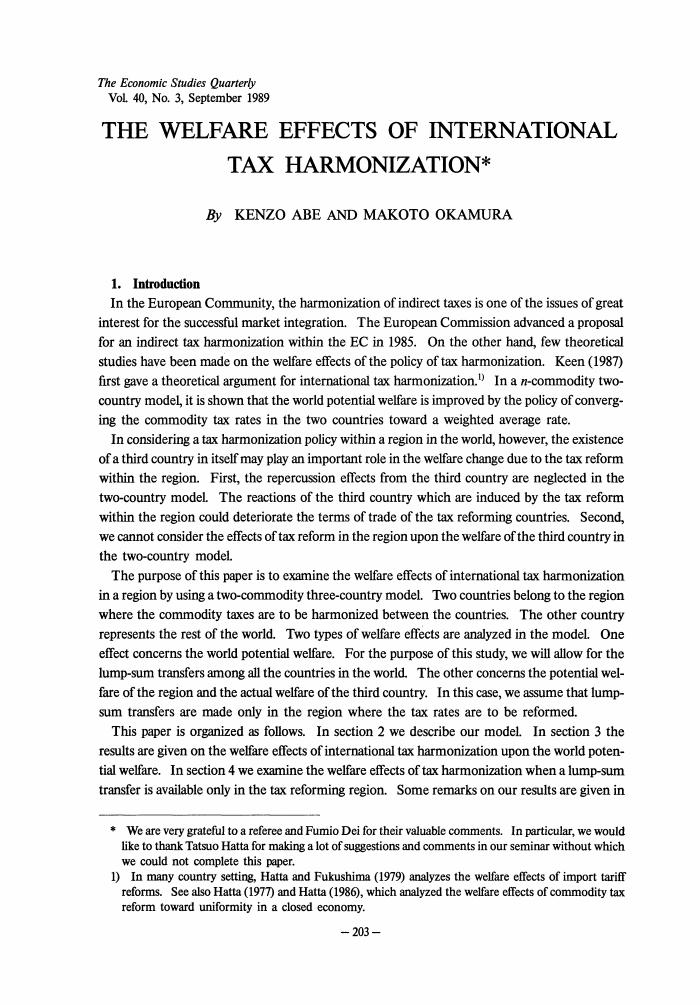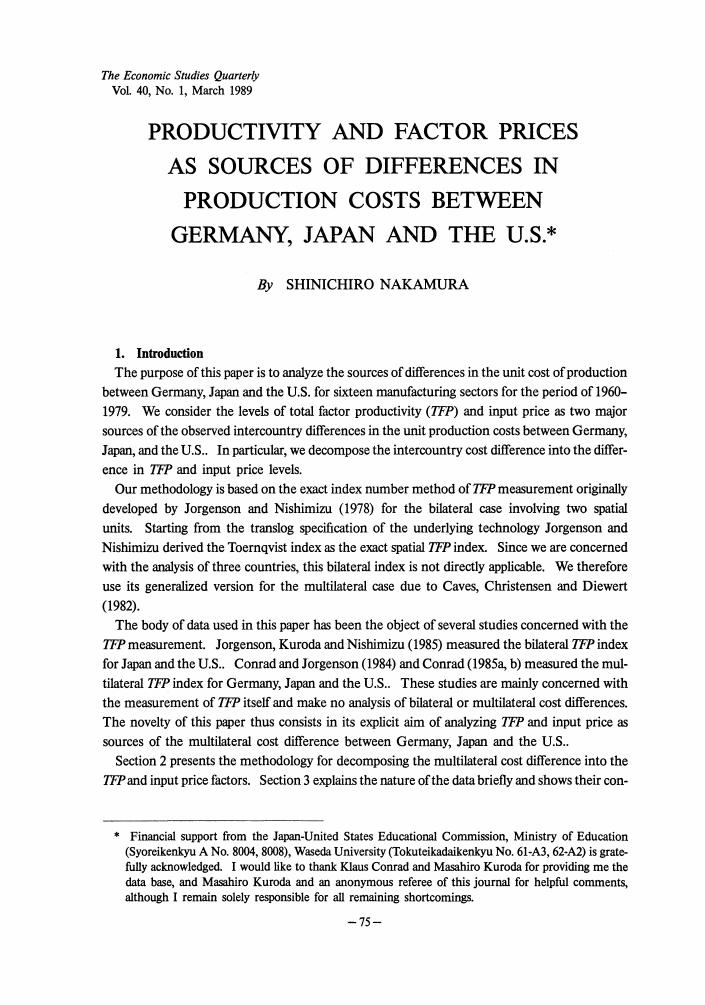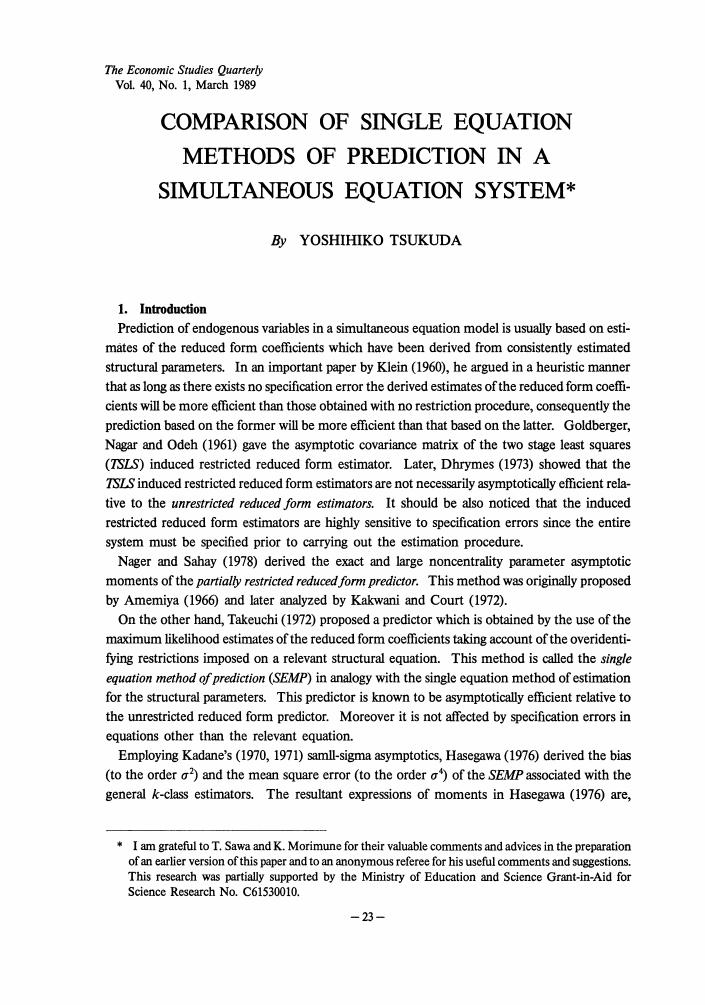- 著者
- TATSUO HATTA
- 出版者
- JAPANESE ECONOMIC ASSOCIATION
- 雑誌
- The Economic Studies Quarterly (ISSN:0557109X)
- 巻号頁・発行日
- vol.40, no.3, pp.193-194, 1989-09-20 (Released:2007-10-19)
1 0 0 0 OA MULTILATERAL TAX AND TARIFF REFORM
- 著者
- MICHAEL KEEN
- 出版者
- JAPANESE ECONOMIC ASSOCIATION
- 雑誌
- The Economic Studies Quarterly (ISSN:0557109X)
- 巻号頁・発行日
- vol.40, no.3, pp.195-202, 1989-09-20 (Released:2007-10-19)
- 参考文献数
- 15
- 著者
- KENZO ABE MAKOTO OKAMURA
- 出版者
- JAPANESE ECONOMIC ASSOCIATION
- 雑誌
- The Economic Studies Quarterly (ISSN:0557109X)
- 巻号頁・発行日
- vol.40, no.3, pp.203-211, 1989-09-20 (Released:2007-10-19)
- 参考文献数
- 9
- 著者
- HIDEO KONISHI
- 出版者
- JAPANESE ECONOMIC ASSOCIATION
- 雑誌
- The Economic Studies Quarterly (ISSN:0557109X)
- 巻号頁・発行日
- vol.40, no.3, pp.212-219, 1989-09-20 (Released:2007-10-19)
- 参考文献数
- 6
1 0 0 0 OA WHY NOT TAX UNIFORMLY RATHER THAN OPTIMALLY?
- 著者
- TAKASHI FUKUSHIMA TATSUO HATTA
- 出版者
- JAPANESE ECONOMIC ASSOCIATION
- 雑誌
- The Economic Studies Quarterly (ISSN:0557109X)
- 巻号頁・発行日
- vol.40, no.3, pp.220-238, 1989-09-20 (Released:2007-10-19)
- 参考文献数
- 29
1 0 0 0 OA TAXATION OF COMPENSATING WAGE VARIATION
- 著者
- BRUCE W. HAMILTON PAUL T. DECKER
- 出版者
- JAPANESE ECONOMIC ASSOCIATION
- 雑誌
- The Economic Studies Quarterly (ISSN:0557109X)
- 巻号頁・発行日
- vol.40, no.3, pp.239-250, 1989-09-20 (Released:2007-10-19)
- 参考文献数
- 23
- 著者
- SHIGEO TAKEDA
- 出版者
- JAPANESE ECONOMIC ASSOCIATION
- 雑誌
- The Economic Studies Quarterly (ISSN:0557109X)
- 巻号頁・発行日
- vol.40, no.1, pp.53-65, 1989-03-20 (Released:2007-10-19)
- 参考文献数
- 21
- 著者
- TOSHIHIRO IHORI
- 出版者
- JAPANESE ECONOMIC ASSOCIATION
- 雑誌
- The Economic Studies Quarterly (ISSN:0557109X)
- 巻号頁・発行日
- vol.40, no.1, pp.66-74, 1989-03-20 (Released:2007-10-19)
- 参考文献数
- 16
- 著者
- SHINICHIRO NAKAMURA
- 出版者
- JAPANESE ECONOMIC ASSOCIATION
- 雑誌
- The Economic Studies Quarterly (ISSN:0557109X)
- 巻号頁・発行日
- vol.40, no.1, pp.75-89, 1989-03-20 (Released:2007-10-19)
- 参考文献数
- 13
1 0 0 0 OA SEARCH WHILE CONSUMING
- 著者
- R. MANNING
- 出版者
- JAPANESE ECONOMIC ASSOCIATION
- 雑誌
- The Economic Studies Quarterly (ISSN:0557109X)
- 巻号頁・発行日
- vol.40, no.2, pp.97-108, 1989-06-20 (Released:2007-10-19)
- 参考文献数
- 22
1 0 0 0 OA IMPLICIT CONTRACTS AND REPUTATIONS
- 著者
- HIROSHI OSANO
- 出版者
- JAPANESE ECONOMIC ASSOCIATION
- 雑誌
- The Economic Studies Quarterly (ISSN:0557109X)
- 巻号頁・発行日
- vol.40, no.2, pp.109-121, 1989-06-20 (Released:2007-10-19)
- 参考文献数
- 23
- 著者
- RICHARD CORNES FRANK MILNE
- 出版者
- JAPANESE ECONOMIC ASSOCIATION
- 雑誌
- The Economic Studies Quarterly (ISSN:0557109X)
- 巻号頁・発行日
- vol.40, no.2, pp.122-134, 1989-06-20 (Released:2007-10-19)
- 参考文献数
- 30
1 0 0 0 OA 石油価格変化のマクロ•インパクト 日本経済の一般均衡 (CGE) 分析
- 著者
- 江崎 光男
- 出版者
- 日本経済学会
- 雑誌
- The Economic Studies Quarterly (ISSN:0557109X)
- 巻号頁・発行日
- vol.40, no.2, pp.135-151, 1989-06-20 (Released:2007-10-19)
- 参考文献数
- 14
Using a computable general equilibrium (CGE) model of Japan that integrates real and financial sectors, this paper quantitatively evaluates impacts of oil price changes on the Japanese economy in both industrial and macro levels. The integration of real and financial sectors is a new attempt in the field of CGE studies, which makes it possible to analyze not only such real aspects of industrial production and GDP growth but also such monetary aspects as inflation and foreign exchange rate. Impacts of oil price changes are analyzed by comparative statics in 1982. Results are summarized as eight implications on macro fundamental variables, industrial productions and prices, and structural and technological changes.
1 0 0 0 OA 財政赤字と資本形成 インフレ税の与える影響について
- 著者
- 岩本 康志
- 出版者
- 日本経済学会
- 雑誌
- The Economic Studies Quarterly (ISSN:0557109X)
- 巻号頁・発行日
- vol.40, no.2, pp.152-165, 1989-06-20 (Released:2007-10-19)
- 参考文献数
- 30
This paper analyzes the long run effects of budget deficits on capital formation and inflation using the concept of the real budget deficit. The paper shows that in the long run the real deficit has policy implications that are opposite to the traditional budget deficit adopted in previous theoretical work. Under the real deficit framework, budget deficits depress capital formation in the debt financing case or the constant expenditure case, but facilitate capital formation in the money finance case with constant tax revenue. The paper also considers how alternative specifications of the savings base affect these conclusions.
1 0 0 0 OA EXPECTATIONAL COORDINATION FAILURE
- 著者
- KIYOHIKO G. NISHIMURA
- 出版者
- JAPANESE ECONOMIC ASSOCIATION
- 雑誌
- The Economic Studies Quarterly (ISSN:0557109X)
- 巻号頁・発行日
- vol.39, no.4, pp.322-334, 1988-12-20 (Released:2007-10-19)
- 参考文献数
- 10
- 著者
- MAMORU KANEKO
- 出版者
- JAPANESE ECONOMIC ASSOCIATION
- 雑誌
- The Economic Studies Quarterly (ISSN:0557109X)
- 巻号頁・発行日
- vol.39, no.4, pp.335-355, 1988-12-20 (Released:2007-10-19)
- 参考文献数
- 15
- 著者
- KAZUHARU KIYONO MASAHIRO OKUNO-FUJIWARA
- 出版者
- JAPANESE ECONOMIC ASSOCIATION
- 雑誌
- The Economic Studies Quarterly (ISSN:0557109X)
- 巻号頁・発行日
- vol.39, no.4, pp.356-377, 1988-12-20 (Released:2007-10-19)
- 参考文献数
- 14
- 著者
- YOICHI SHINKAI
- 出版者
- JAPANESE ECONOMIC ASSOCIATION
- 雑誌
- The Economic Studies Quarterly (ISSN:0557109X)
- 巻号頁・発行日
- vol.40, no.1, pp.1-13, 1989-03-20 (Released:2007-10-19)
- 参考文献数
- 39
Although international coordination of macroeconomic policy-making sounds like a way to improve international relations more generally, there is a serious risk that it will have the opposite effect. An emphasis on international interdependence instead of sound domestic policies makes foreign governments the natural scapegoats for any poor economic performance. Pressing a foreign government to alter its domestic economic policies is itself a source of friction and the making of unkeepable promises can only lead to reaentment. It woule in general be far better if the major industrial countries concentrated on the pursuit of sound domestic economic policies and reserved the pursuit of international cooperation for those subjects like international trade and national security in which cooperation is truly essential.M. S. FeldsteinJournal of Economic Perspective, Spring 1988, p. 12
- 著者
- TAKESHI AMEMIYA KEIKO SHIMONO
- 出版者
- JAPANESE ECONOMIC ASSOCIATION
- 雑誌
- The Economic Studies Quarterly (ISSN:0557109X)
- 巻号頁・発行日
- vol.40, no.1, pp.14-22, 1989-03-20 (Released:2007-10-19)
- 参考文献数
- 6
- 著者
- YOSHIHIKO TSUKUDA
- 出版者
- JAPANESE ECONOMIC ASSOCIATION
- 雑誌
- The Economic Studies Quarterly (ISSN:0557109X)
- 巻号頁・発行日
- vol.40, no.1, pp.23-34, 1989-03-20 (Released:2007-10-19)
- 参考文献数
- 17
















